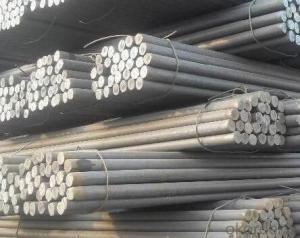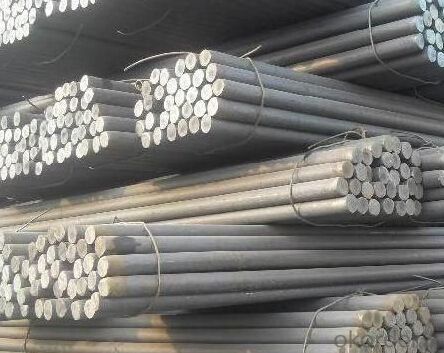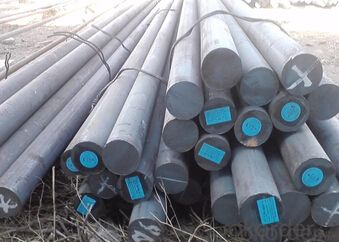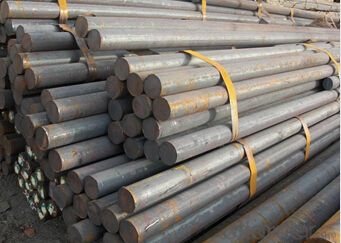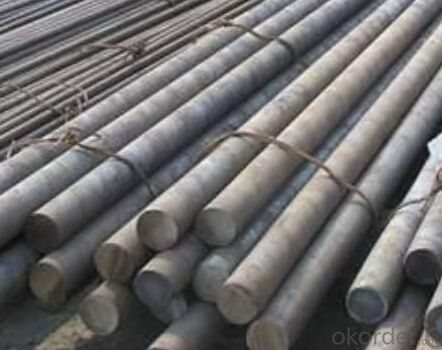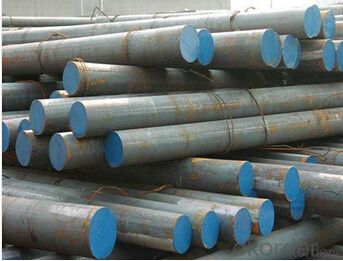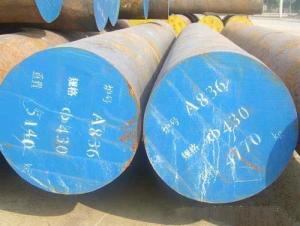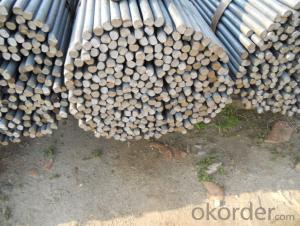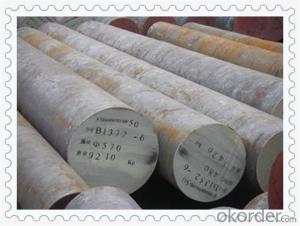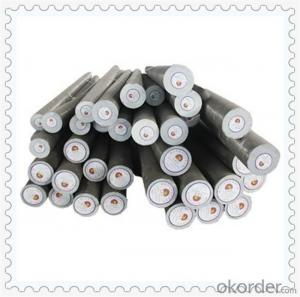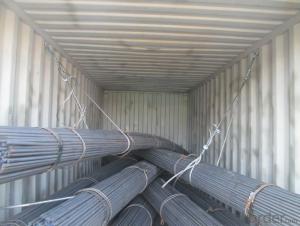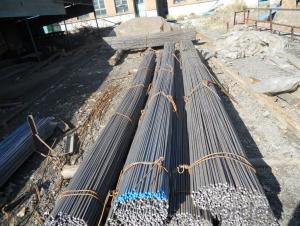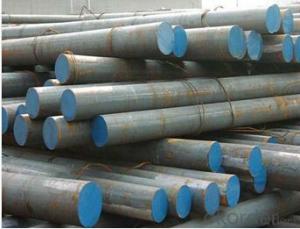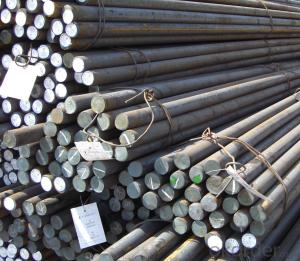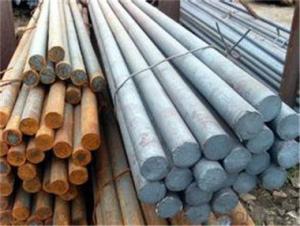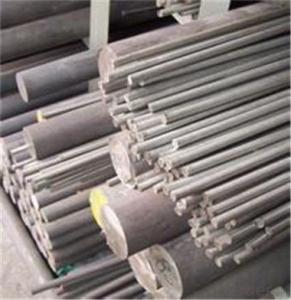Chrome Chinese Standard Round Bar with Prime Newly Produced Hot Rolled Alloy
- Loading Port:
- Tianjin
- Payment Terms:
- TT or LC
- Min Order Qty:
- 50 m.t.
- Supply Capability:
- 10000 m.t./month
OKorder Service Pledge
OKorder Financial Service
You Might Also Like
Specification
Product Description:
OKorder is offering Chrome Chinese Standard Round Bar with Prime Newly Produced Hot Rolled Alloy at great prices with worldwide shipping. Our supplier is a world-class manufacturer of steel, with our products utilized the world over. OKorder annually supplies products to European, North American and Asian markets. We provide quotations within 24 hours of receiving an inquiry and guarantee competitive prices.
Product Applications:
Chrome Chinese Standard Round Bar with Prime Newly Produced Hot Rolled Alloy re ideal for structural applications and are widely used in the construction of buildings and bridges, and the manufacturing, petrochemical, and transportation industries.
Product Advantages:
OKorder's Chrome Chinese Standard Round Bar with Prime Newly Produced Hot Rolled Alloy are durable, strong, and resist corrosion.
Main Product Features:
· Premium quality
· Prompt delivery & seaworthy packing (30 days after receiving deposit)
· Corrosion resistance
· Can be recycled and reused
· Mill test certification
· Professional Service
· Competitive pricing
Specifications of Chrome Chinese Standard Round Bar with Prime Newly Produced Hot Rolled Alloy
1. Grade: Q195, Q235, Q345
2. Diameter: 6mm-150mm
3. Length: 6m, 9m, 12m or as customer’s request
4. Tolerance: Within ±5% for weight; ±2mm for diameter
5. Note: The price can be better is the quantity is good
6. Chemical composition
Alloy No | Element (%) | ||||
C | Mn | S | P | Si | |
Q195 | 0.06-0.12 | 0.25 | ≤0.05 | ≤0.045 | ≤0.3 |
Q235 | 0.12—0.20 | 0.3—0.7 | ≤0.045 | ≤0.045 | ≤0.3 |
Q345 | ≤0.2 | 1.00-1.60 | ≤0.045 | ≤0.045 | ≤0.55 |
Usage and Applications of Chrome Chinese Standard Round Bar with Prime Newly Produced Hot Rolled Alloy
1. Chinese standard steel bar is often used where large amounts of steel need to be formed, for example as structural steel.
2. And we can use this kind of product on the performance of the mechanical parts if the demand is not very high.
3. Steel round bar is used in construction and a large number of architectural and engineering structures.
Packaging & Delivery of Chrome Chinese Standard Round Bar with Prime Newly Produced Hot Rolled Alloy
Packaging Detail: All goods are packed in bundle with steel strips and shipped by break bulk vessel or container (depend on target market and different ports)
Delivery Detail: 45 days
Trade terms: FOB, CFR, CIF
MOQ: 25 tons per specification; we can negotiate the quantity if the specification is normal or we have stock of one specification.
Weight: The price invoicing on theoretical weight basis or actual weight basis depends on customer’s request.
Shipment: The shipment of bulk break or container is depends on customer’s request and the situation of the port of destination.
Documents given: Full set of original clean on board bill of lading; Original signed commercial invoice; Original packing list; Policy of insurance; Certificate of origin and what the target market needs.
Production Flow of Chrome Chinese Standard Round Bar with Prime Newly Produced Hot Rolled Alloy
1. The common processes are preheated forging quenching, dual refinement solution process, cooling quenching and isothermal quenching. We use heat treatment for dual refinement solution process.
2. Material prepare (billet) — heat up — rough rolling — precision rolling — cooling — packing — storage and transportation
Characteristics of Chrome Chinese Standard Round Bar with Prime Newly Produced Hot Rolled Alloy
1. The steel in which the main interstitial alloying constituent is carbon in the range of 0.12–2.0%.
2. As the carbon percentage content rises, steel has the ability to become harder and stronger through heat treating; however it becomes less ductile.
3. Quality should be in conformity with the specification of the manufacturer. Quantity and packing conditions should be in conformity with the term in the contract.
4. Regardless of the heat treatment, higher carbon content reduces weld ability. In carbon steels, the higher carbon content lowers the melting point.
FAQ:
Q1: Why buy Materials & Equipment from OKorder.com?
A1: All products offered byOKorder.com are carefully selected from China's most reliable manufacturing enterprises. Through its ISO certifications, OKorder.com adheres to the highest standards and a commitment to supply chain safety and customer satisfaction.
Q2: How do we guarantee the quality of our products?
A2: We have established an advanced quality management system which conducts strict quality tests at every step, from raw materials to the final product. At the same time, we provide extensive follow-up service assurances as required.
Q3: How soon can we receive the product after purchase?
A3: Within three days of placing an order, we will begin production. The specific shipping date is dependent upon international and government factors, but is typically 7 to 10 workdays.
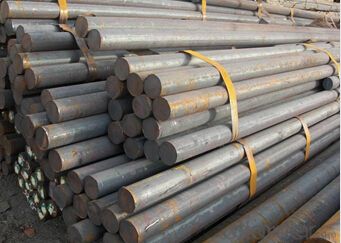
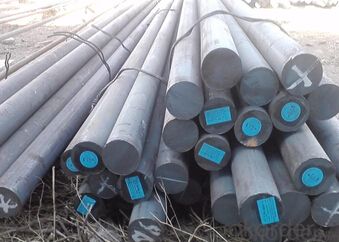
- Q: What is the maximum weight that can be lifted using a steel round bar as a lifting rod?
- The lifting capacity of a steel round bar depends on several factors, including its diameter, length, material composition, and lifting technique. Different steel round bars have different load-bearing capacities based on their dimensions and grade. Engineering principles and specific formulas can be used to calculate the load-bearing capacity of a steel bar based on its material and geometry. To determine the maximum weight that can be lifted with a particular steel round bar, it is important to consider its ultimate tensile strength, yield strength, and factor of safety. The ultimate tensile strength represents the maximum stress the material can handle before failure, while the yield strength is the stress at which permanent deformation occurs. The factor of safety is a design parameter that takes uncertainties into account and ensures structural integrity. To obtain accurate and reliable information about the load-bearing capacity of a specific steel round bar, it is crucial to consult engineering references, standards, or professionals. They can provide the necessary calculations, considering the bar's diameter, length, material properties, intended lifting application, and safety requirements. In conclusion, the maximum weight that can be lifted using a steel round bar as a lifting rod depends on various factors and cannot be determined without considering the specific characteristics of the bar and the lifting scenario. Consulting engineering resources or experts is essential to ensure safe and accurate calculations.
- Q: How is the weight of a steel round bar calculated?
- The weight of a steel round bar is calculated using a formula that takes into account the diameter of the bar, the length of the bar, and the density of the specific type of steel being used. The formula is as follows: Weight = (π/4) x (diameter)^2 x length x density In this formula, π represents the mathematical constant pi (approximately 3.14159), the diameter is the measurement across the widest point of the round bar, the length is the measurement of the bar from end to end, and the density is the mass per unit volume of the specific type of steel. By plugging in the values for diameter, length, and density into this formula, you can calculate the weight of a steel round bar. Keep in mind that the weight will be in units of mass, such as kilograms or pounds, depending on the system of measurement being used.
- Q: Can steel round bars be used in the telecommunications industry?
- Indeed, the telecommunications industry can make effective use of steel round bars. These bars are frequently employed to offer structural reinforcement for a range of telecommunications equipment, including antennas, satellite dishes, and communication towers. Notably resilient, these bars can withstand adverse weather conditions, rendering them well-suited for outdoor installations. Furthermore, the ease with which steel round bars can be fabricated and molded to meet precise design specifications enables the seamless integration of diverse components within the telecommunications infrastructure.
- Q: What is the difference between carbon steel and alloy steel round bars?
- Carbon steel round bars are made primarily of carbon and iron, while alloy steel round bars are made of carbon, iron, and other elements such as chromium, nickel, or manganese. Alloy steel round bars have enhanced properties such as increased strength, hardness, and resistance to corrosion, making them ideal for applications that require higher performance. On the other hand, carbon steel round bars are more affordable and have good machinability, making them suitable for general-purpose use.
- Q: What are the advantages of using high-temperature steel round bars?
- There are several advantages of using high-temperature steel round bars in various applications. Firstly, high-temperature steel round bars have excellent heat resistance properties, allowing them to withstand elevated temperatures without compromising their structural integrity. This makes them ideal for use in industries such as aerospace, automotive, and power generation, where components are exposed to extreme heat conditions. Another advantage of high-temperature steel round bars is their superior strength and durability. These bars are designed to withstand high mechanical stresses, making them ideal for applications that require heavy loads or intense pressure. Their high strength-to-weight ratio also allows for lighter and more efficient designs, reducing overall material and production costs. In addition, high-temperature steel round bars have excellent corrosion resistance properties. This means they can withstand exposure to harsh environments, including chemicals, moisture, and saltwater, without experiencing significant degradation. This makes them suitable for use in marine, chemical, and oil and gas industries where corrosion resistance is crucial. Furthermore, high-temperature steel round bars offer excellent dimensional stability, meaning they maintain their shape and size even under extreme temperature fluctuations. This property is highly beneficial in applications where precision and accuracy are essential, such as in machining and tooling. Lastly, high-temperature steel round bars are readily available in various sizes, grades, and finishes, allowing for flexibility and customization to meet specific project requirements. This versatility makes them suitable for a wide range of applications and ensures that there is a suitable option for every project, regardless of complexity or industry. Overall, the advantages of using high-temperature steel round bars include superior heat resistance, strength, durability, corrosion resistance, dimensional stability, and versatility. These properties make them an excellent choice for various industries and applications, ensuring reliable and long-lasting performance in demanding environments.
- Q: How do steel round bars compare to concrete round bars?
- There are several notable distinctions between steel round bars and concrete round bars. To begin with, steel round bars are composed of a robust and long-lasting material, while concrete round bars are made from a composite material containing cement, aggregates, and water. This dissimilarity in materials grants steel round bars a higher tensile strength and resistance to bending and deformation in contrast to concrete round bars, which are more susceptible to cracking and breaking under stress. Additionally, steel round bars provide greater flexibility in terms of design and customization. They can be easily molded, bent, and trimmed to specific lengths and dimensions, making them highly versatile for various applications. Conversely, concrete round bars are typically available in standard sizes and shapes, thereby limiting their design possibilities. Another crucial aspect to consider is weight. Steel round bars generally have a lighter weight compared to concrete round bars, rendering them easier to handle and transport. This weight advantage also results in reduced structural loads, allowing for more efficient and cost-effective construction. In regard to corrosion resistance, steel round bars necessitate additional protective measures such as coatings or galvanization to prevent rust and corrosion, particularly in humid or marine environments. Conversely, concrete round bars possess natural resistance to corrosion. This factor can significantly influence the long-term durability and maintenance requirements of a structure. Lastly, cost is a pivotal factor to take into account. Although steel round bars may entail a higher initial material cost compared to concrete round bars, their superior strength and durability can result in long-term cost savings. Concrete round bars may require more frequent maintenance and repairs, which can accumulate over time. In conclusion, steel round bars offer superior strength, flexibility, and durability in comparison to concrete round bars. However, the choice between the two is contingent upon the specific requirements of the project, including factors such as design flexibility, weight considerations, corrosion resistance, and cost.
- Q: Can steel round bars be used in high-temperature applications?
- High-temperature applications can indeed utilize steel round bars. Steel possesses remarkable strength and durability, enabling it to endure high temperatures without any distortion or compromise to its structural integrity. Nevertheless, the suitability of steel for high-temperature applications is contingent upon the specific type of steel and its composition. For instance, stainless steel exhibits exceptional resistance to heat and can be employed in a broad spectrum of high-temperature settings. Furthermore, certain alloy steels are purposefully crafted for use in high-temperature applications, commonly encountered in industries like aerospace or petrochemicals. It is crucial to consult experts and carefully consider the specific requirements of the application in order to select the most appropriate steel round bars for high-temperature conditions.
- Q: How are steel round bars measured?
- Steel round bars are typically measured by their diameter. The diameter is determined by measuring the distance across the widest point of the bar, usually in millimeters or inches. It is important to note that the diameter measurement is taken at the greatest cross-section of the round bar, which is the distance across the center point. This measurement is crucial for various applications as it helps determine the strength, stability, and load-bearing capacity of the steel round bar.
- Q: What are the different types of steel round bar finishes for decorative purposes?
- There are several different types of steel round bar finishes that are commonly used for decorative purposes. These finishes can enhance the aesthetic appeal and overall look of the steel round bar, making it suitable for various decorative applications. Some of the most popular finishes include: 1. Polished Finish: This is a smooth and shiny finish achieved by polishing the steel round bar using abrasives. It gives a reflective, mirror-like surface that adds a touch of elegance and sophistication to any decorative project. 2. Brushed Finish: Also known as satin finish, this type of finish is achieved by brushing the steel round bar with a fine abrasive material, creating a textured pattern. It provides a slightly matte appearance, making it suitable for contemporary or industrial-style decorative applications. 3. Hammered Finish: This finish involves striking the steel round bar with a hammer, creating a textured and hammered surface. It gives a rustic and aged appearance, making it ideal for decorative items with a vintage or antique-inspired theme. 4. Blackened Finish: This finish is achieved by applying a chemical or heat treatment to the steel round bar, resulting in a darkened or blackened appearance. It adds a sleek and modern touch to decorative projects, making it a popular choice for contemporary designs. 5. Powder Coated Finish: Powder coating is a durable and long-lasting finish where a powdered paint is electrostatically applied to the steel round bar and then cured under heat. This finish allows for a wide range of color options and provides excellent protection against corrosion, making it suitable for both indoor and outdoor decorative applications. These are just a few examples of the different types of steel round bar finishes that can be used for decorative purposes. Choosing the right finish depends on the desired aesthetic, style, and overall theme of the decorative project.
- Q: Can steel round bars be bent or shaped?
- Yes, steel round bars can be bent or shaped using various methods such as heating, mechanical force, or specialized equipment like hydraulic presses.
Send your message to us
Chrome Chinese Standard Round Bar with Prime Newly Produced Hot Rolled Alloy
- Loading Port:
- Tianjin
- Payment Terms:
- TT or LC
- Min Order Qty:
- 50 m.t.
- Supply Capability:
- 10000 m.t./month
OKorder Service Pledge
OKorder Financial Service
Similar products
Hot products
Hot Searches
Related keywords
